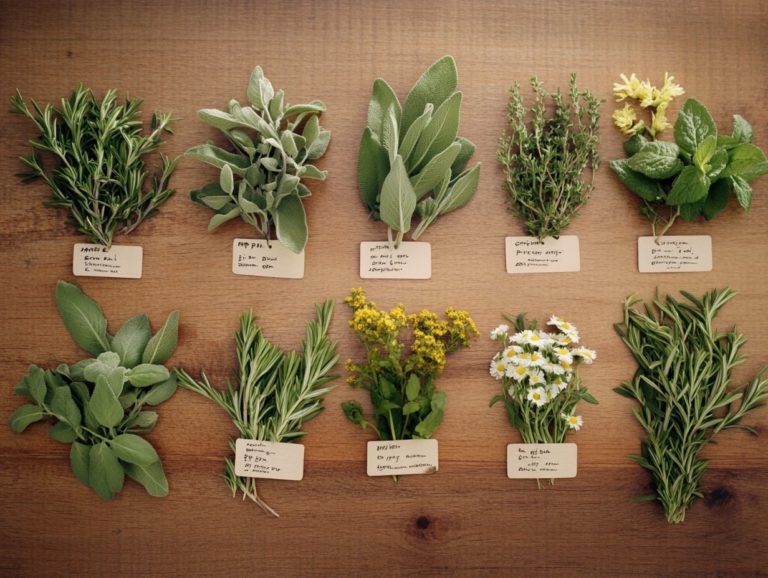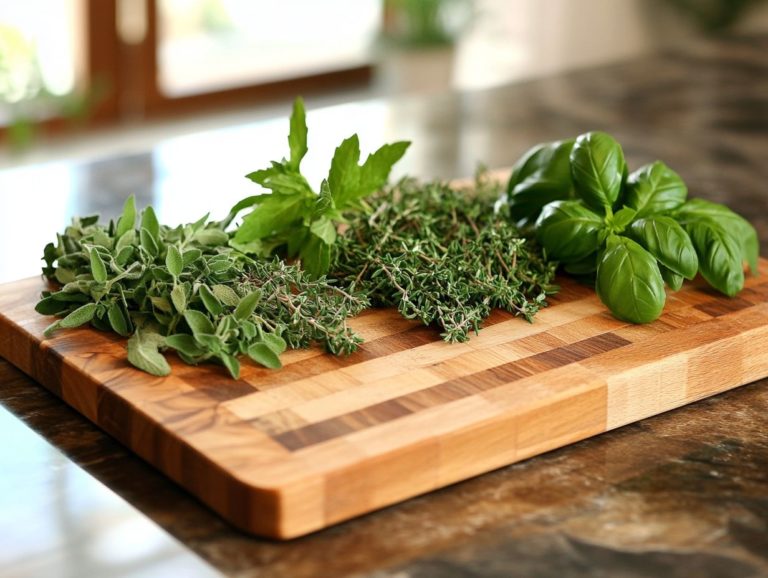How to Safely Store Herbal Remedies for Dosage
Herbal remedies have served as a time-honored approach to healing and wellness for centuries. As your interest in these natural solutions deepens, it’s important to know their benefits and understand the best practices for storing and using them safely.
This exploration delves into various aspects of herbal remedies, highlighting their potential health benefits, proper storage techniques, dosage recommendations, and common pitfalls to avoid.
Embark on this journey into the realm of herbal healing, ensuring you maximize the advantages that these natural solutions have to offer.
Contents
- Key Takeaways:
- Benefits of Herbal Remedies
- Proper Storage of Herbal Remedies
- Dosage Recommendations for Herbal Remedies
- Common Mistakes in Storing and Dosage of Herbal Remedies
- Frequently Asked Questions
- Why is it important to store herbal remedies safely?
- What types of containers are best for storing herbal remedies?
- Can herbal remedies be stored in the fridge or freezer?
- How should I label my stored herbal remedies?
- What are some common mistakes people make when storing herbal remedies?
Key Takeaways:
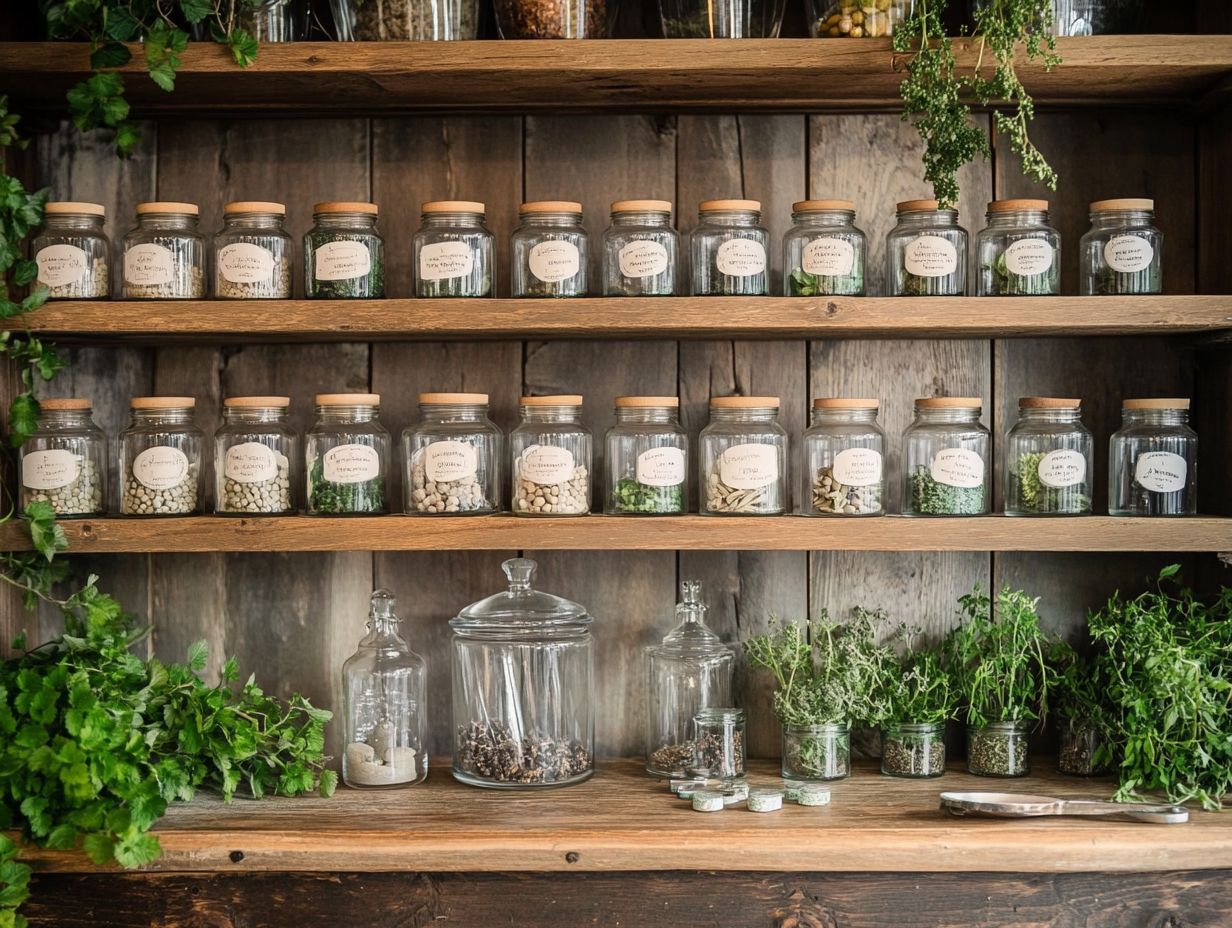
- Proper storage is essential for maintaining the quality and potency of herbal remedies. Factors like light, moisture, and temperature can affect their effectiveness.
- When it comes to dosage, it is important to consider factors like age, weight, and health condition. Always start with a low dosage and gradually increase if needed.
- Avoid common mistakes in storing and dosing herbal remedies by properly labeling, storing them in a cool and dry place, and following recommended dosage guidelines. Don t wait consult your doctor for personalized advice.
What are Herbal Remedies?
Herbal remedies, often referred to as herbal health products, offer a rich array of natural treatments derived from plants, roots, and herbs that have been cherished in traditional medicine for centuries. These remedies frequently tout health benefits, promising relief from various conditions and enhancing overall wellness.
However, it s essential to recognize that not all herbal products are created equal; the FDA doesn t regulate them with the same rigor as medications prescribed by doctors. This makes careful research and stringent quality control essential when considering herbal remedies for any health concerns.
These treatments trace their roots back to ancient civilizations, where they played vital roles in healthcare practices. Take chamomile, for example celebrated for its calming properties or echinacea, often hailed for its immune-boosting benefits; both illustrate the enduring connection between tradition and modern wellness.
While many individuals find herbal solutions effective, it s important to approach their use with caution. The lack of comprehensive regulation can lead to variations in quality and potency, potentially compromising safety. Therefore, consulting a doctor before integrating herbal remedies into your treatment regimen is always a prudent choice.
Benefits of Herbal Remedies
Herbal remedies present a wealth of potential health benefits that have captured the interest of those exploring natural health and wellness. Many individuals are drawn to these remedies as a way to enhance their well-being, seeking alternatives to conventional medications.
Whether it’s alleviating digestive troubles or fortifying immunity, the advantages of herbal supplements are abundant. However, it’s crucial to use them correctly and consult a doctor for guidance to maximize their effectiveness and safety.
Natural Healing and Potential Health Benefits
Natural healing with herbal supplements has become quite the trend, and you re not alone in seeking remedies that resonate with a holistic approach to health. High-quality herbal products can provide numerous benefits, such as reducing inflammation, alleviating anxiety, and boosting your immune function. However, it s essential to consider potential side effects and interactions with any prescribed medications, as the efficacy and safety of these products can differ widely. This highlights the importance of thorough research and consultation with a doctor.
Take turmeric, for example; it s celebrated for its anti-inflammatory properties, which help reduce swelling and pain, and can significantly aid in managing conditions like arthritis. Then there’s chamomile, known for its soothing effects, which can help you unwind and promote better sleep.
Yet, it s vital to remember that these remedies might interact with other medications, such as blood thinners, which could lead to complications. As you explore these natural alternatives, prioritize the benefits of the herbs while staying attentive to your unique health conditions and any ongoing treatments to ensure a safe and effective integration into your wellness routine.
Proper Storage of Herbal Remedies
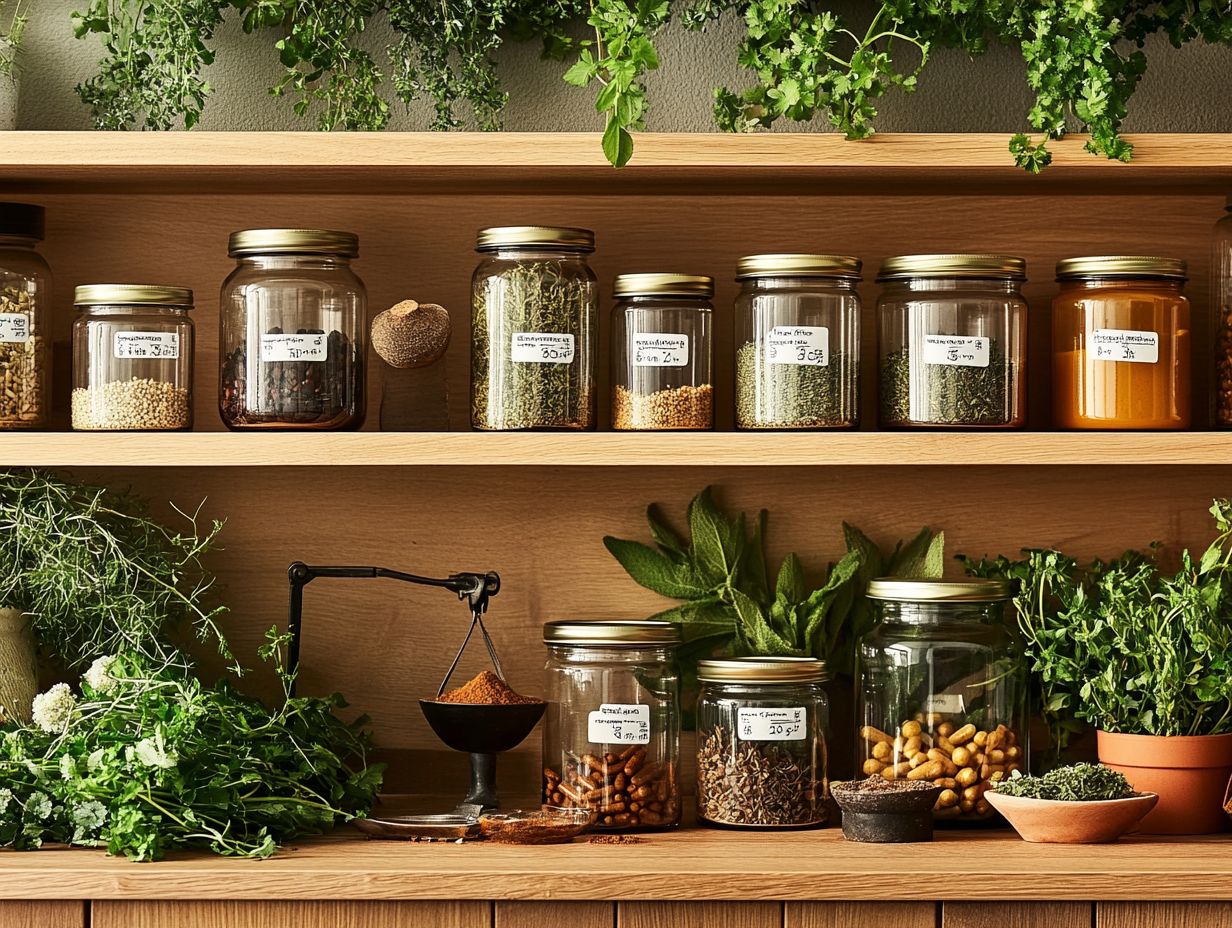
Proper storage of herbal remedies is crucial for maintaining their effectiveness. This is especially important for those managing specific health conditions.
You must keep your herbal products in a cool, dry place, away from direct sunlight and moisture. This helps preserve their potency. For those interested in making your own remedies, consider exploring herbal remedies: creating your own capsules. Keep these remedies in their original container to prevent contamination and degradation. This ultimately protects the safety and effectiveness of your herbal supplements.
Factors Affecting Storage
Many factors can influence how you store your herbal remedies, impacting their safety and effectiveness over time. Exposure to humidity, light, and temperature fluctuations can lead to degradation, diminishing the potency of these natural products.
To ensure safety and efficacy, you should keep your herbal supplements in a cool, dry place and regularly check expiration dates. Using old or expired products could pose health risks that you definitely want to avoid.
Knowing these factors is key for anyone using herbal remedies. High humidity can cause mold growth, while too much light can break down valuable compounds, leading to reduced effectiveness.
By adopting effective methods such as using airtight containers and storing your remedies in dark areas, you can significantly enhance their preservation. Additionally, learning how to store and preserve herbal teas can be beneficial. Monitoring humidity levels with hygrometers and regularly checking temperature settings for optimal conditions will help you maintain the quality of your herbal products, ensuring they deliver their intended therapeutic benefits.
Best Practices for Storage
Implementing best practices for the safe storage of herbal remedies is essential for preserving their quality and ensuring they don t become unsafe herbal supplements. Always keep your herbal health products in their original containers, use child-proof caps, and store them out of reach of children to prevent accidental poisoning.
Maintaining a cool, dark environment can significantly extend the effectiveness of your herbal formulations. Exposure to light and heat can degrade their active components.
Label each container clearly with expiration dates and usage instructions. This enhances both safety and awareness. Seeking out reputable sources for purchasing herbal remedies builds consumer trust, as transparency in product quality and sourcing is crucial.
Ultimately, following these safety measures protects you and contributes to the overall quality of herbal health products in your community.
Dosage Recommendations for Herbal Remedies
When exploring herbal remedies, it’s vital to follow dosage recommendations to maximize health benefits while minimizing potential side effects. Each herbal supplement comes with specific dosages tailored to the health conditions they address.
Therefore, consulting with a healthcare provider before starting any herbal supplement is crucial. This not only builds your trust in the treatment but also helps you avoid adverse drug interactions, ensuring that your journey toward wellness is both safe and effective.
Don’t risk your health with expired products! Check those expiration dates regularly.
Factors Affecting Dosage
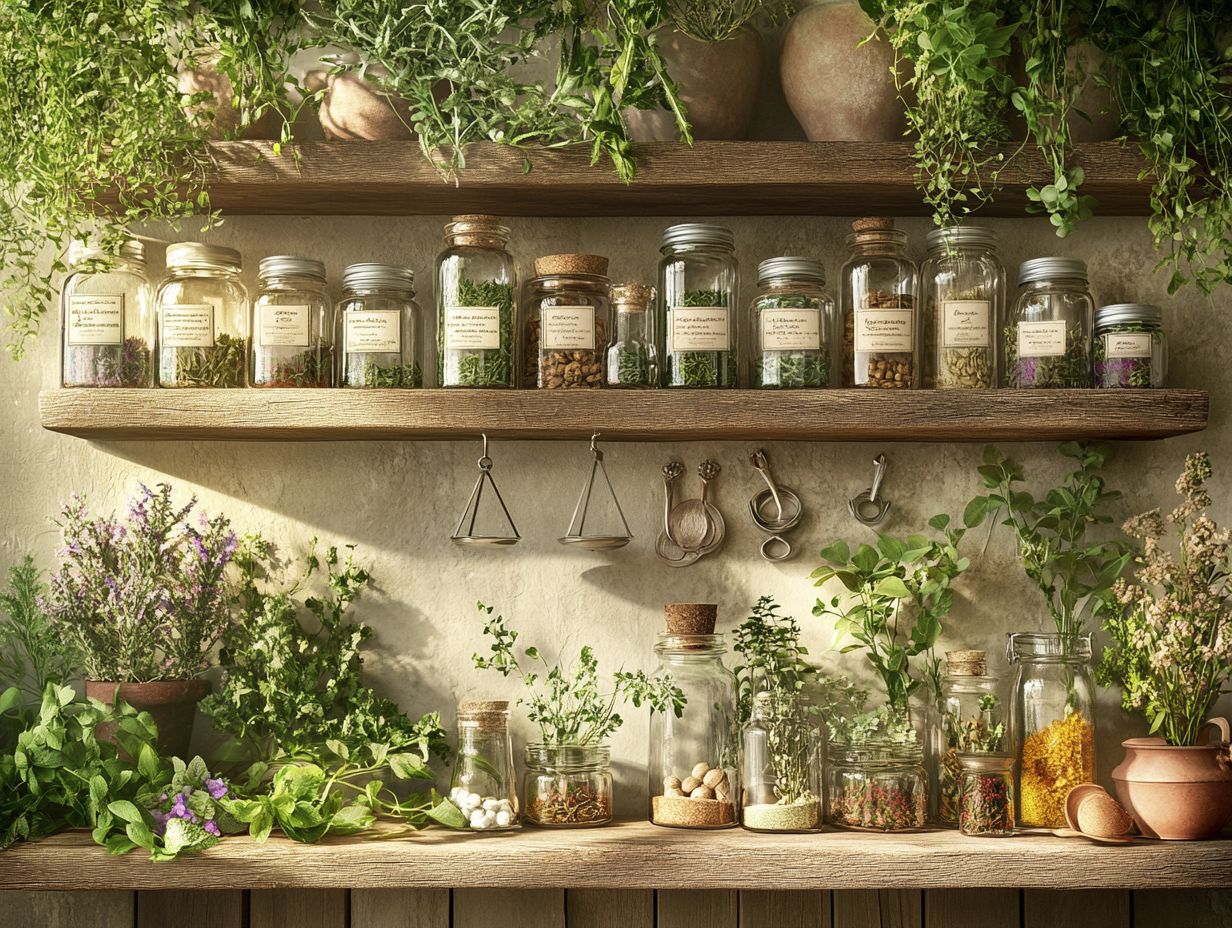
Several factors can influence the appropriate dosage of herbal supplements, especially when addressing specific health concerns. Individual characteristics such as your age, weight, overall health, and any existing medical conditions play a crucial role in determining the right dosage for you.
The form of the herbal supplement, whether it’s tinctures, capsules, or something else, can impact its absorption and effectiveness. This emphasizes the importance of personalized dosage recommendations.
The concentrations of active ingredients in various herbal products can differ significantly, which might require you to adjust the dosage based on your unique needs. For instance, if you have a chronic condition, you may need a higher concentration or a different method of administration to achieve the desired effect. Understanding the importance of safety in herbal medicine is crucial, as others might find themselves more sensitive to certain herbs.
Your lifestyle choices, like your diet and stress levels, influence how your body metabolizes these supplements. This reinforces the need for a tailored approach.
Talking to a healthcare professional is a smart step to ensure your safety and effectiveness with herbal remedies.
Guidelines for Safe Dosage
Creating safe dosage guidelines for herbal remedies is crucial to ensuring both effectiveness and safety when addressing health conditions. Start with a lower dose and gradually increase it while watching for any adverse effects.
It s vital to consider personal factors like age, weight, and underlying health issues, as these can significantly influence how your body responds to herbal treatments. Regularly assess your response to catch any negative changes early on.
Consult with a healthcare professional before adding herbal remedies to your routine, especially if you re taking other medications. This approach maximizes potential benefits and reduces risks associated with unforeseen interactions, highlighting the importance of informed and cautious use.
Common Mistakes in Storing and Dosage of Herbal Remedies
Many individuals often fall into the trap of common mistakes when it comes to storing and dosing herbal remedies, which can compromise both their safety and effectiveness. Don’t overlook checking expiration dates! It s crucial for your health. If you neglect to keep herbal products in a cool, dry place, you may find their potency diminished, exposing yourself to health risks.
Likewise, improper dosage or using herbal supplements without consulting a healthcare provider could lead to adverse effects and negative interactions with prescription medications.
Identifying and Avoiding Mistakes
Identifying and avoiding mistakes is essential for ensuring the safety and effectiveness of herbal remedies. Be mindful of various factors that can compromise product quality or pose health risks.
Check herbal products for expiration dates and examine their packaging for any signs of damage. To prevent dosage errors, use measuring tools like graduated droppers or spoons for accuracy. Educate yourself about potential interactions with medications or allergies to safeguard against unforeseen complications.
By embracing these practical tips, you can enhance your experience with herbal remedies, prioritizing both safety and the intended benefits while appreciating the healing properties these natural solutions offer.
Frequently Asked Questions
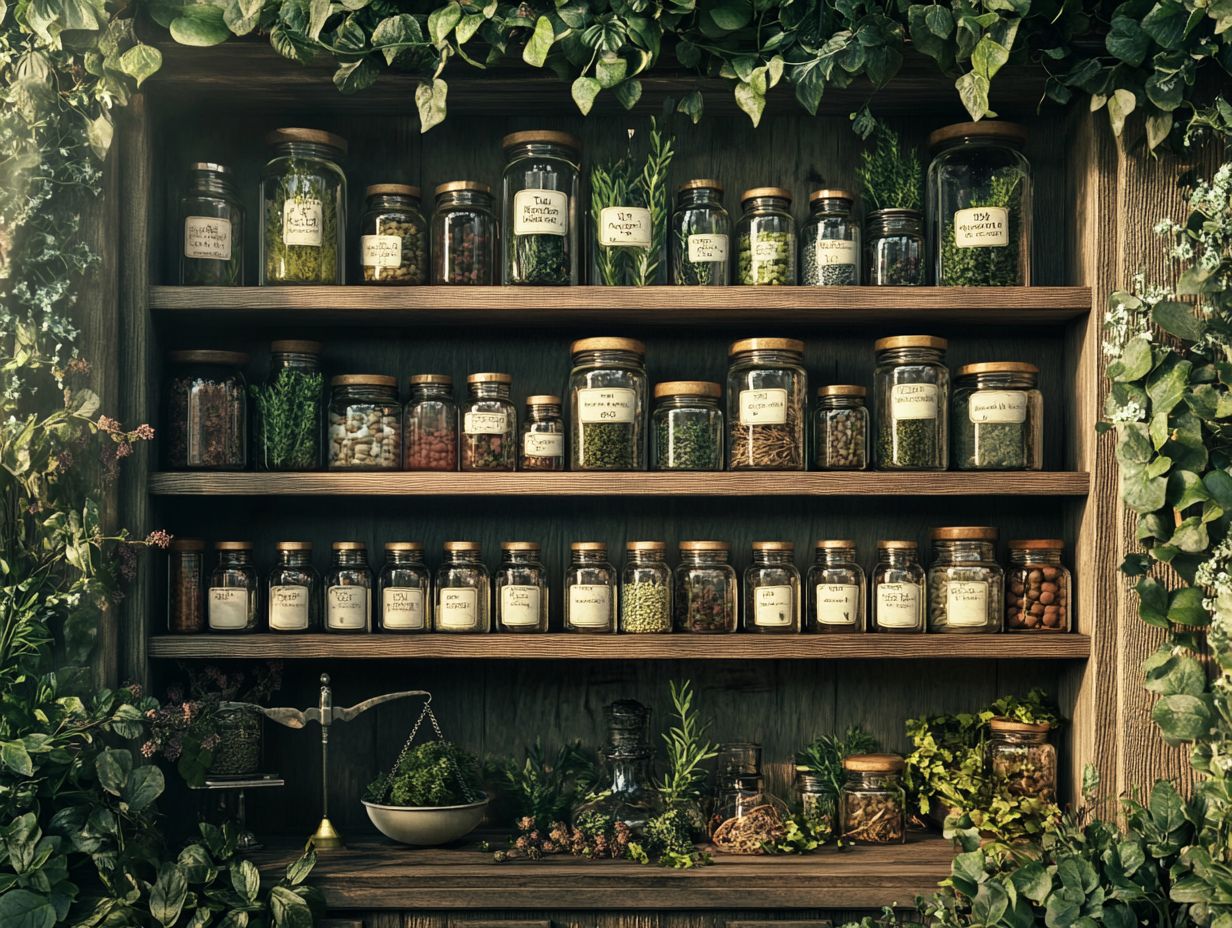
What are the best ways to safely store herbal remedies for dosage?
Some of the best ways to safely store herbal remedies for dosage include using airtight containers, keeping them in a cool and dark place, and labeling them with the dosage and expiration date.
Why is it important to store herbal remedies safely?
Storing herbal remedies safely keeps them strong and effective. It also prevents spoilage and contamination, which can be harmful.
What types of containers are best for storing herbal remedies?
Airtight containers like glass jars or bottles are perfect for storing herbal remedies. They keep out moisture and air, which can weaken the herbs.
Can herbal remedies be stored in the fridge or freezer?
Yes! Certain herbal remedies, especially those made from fresh herbs, can be kept in the fridge or freezer. This helps prolong their shelf life and effectiveness.
How should I label my stored herbal remedies?
Label your herbal remedies with their name, dosage, expiration date, and any special instructions for safe use.
What are some common mistakes people make when storing herbal remedies?
Typical mistakes include using plastic containers, exposing herbs to sunlight or heat, and failing to label them correctly. These actions can affect the herbs’ strength and safety.
Now that you know how to store your herbal remedies properly, take action and organize your collection today!

